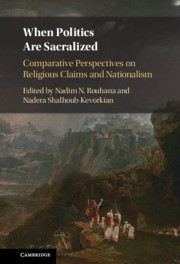Book contents
- When Politics Are Sacralized
- When Politics Are Sacralized
- Copyright page
- Contents
- Figures
- Maps
- Tables
- Contributors
- Preface and Acknowledgments
- 1 A Comparative Perspective on Religious Claims and Sacralized Politics
- Part I Israel
- Part II India
- Part III Sri Lanka
- Part IV Serbia
- Part V Iran
- Part VI Saudi Arabia and Wahhabism
- Part VII Northern Ireland
- Part VIII Palestine
- Index
- References
1 - A Comparative Perspective on Religious Claims and Sacralized Politics
An Introduction
Published online by Cambridge University Press: 10 June 2021
- When Politics Are Sacralized
- When Politics Are Sacralized
- Copyright page
- Contents
- Figures
- Maps
- Tables
- Contributors
- Preface and Acknowledgments
- 1 A Comparative Perspective on Religious Claims and Sacralized Politics
- Part I Israel
- Part II India
- Part III Sri Lanka
- Part IV Serbia
- Part V Iran
- Part VI Saudi Arabia and Wahhabism
- Part VII Northern Ireland
- Part VIII Palestine
- Index
- References
Summary
This chapter examines the impact of the fusion between religious claims and nationalism on state policies – domestically, regionally, and internationally. It offers a comparative perspective on the extent to which religious claims bestow sacredness on the state’s workings of power – or what we define as sacralized politics. The chapter analyzes how, through hegemonic nationalism, states invoke religious claims to legitimize political and national strategic goals in domestic and international politics. To trace the matrix of power that sacralization of politics mobilizes, and when looking comparatively at various case studies, the chapter points to three main (among other) modes of sacralization’s profound impact on politics. The first operates through managing consciousness, including the construction of self-identity in relation to others; the second, through territoriality and the politics of land claims; and the third via political governance, using violence and a necropolitical regime of control. While each mode can operate separately, all operate through mutual reinforcement and each with elements of sacredness, resulting in an emergent power structure that is self-sustaining, religiously infused, and resistant to change.
Keywords
- Type
- Chapter
- Information
- When Politics are SacralizedComparative Perspectives on Religious Claims and Nationalism, pp. 1 - 30Publisher: Cambridge University PressPrint publication year: 2021



